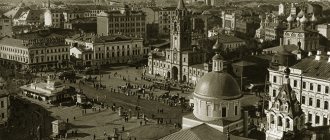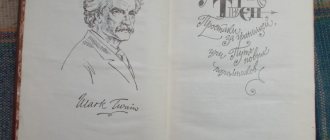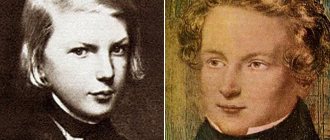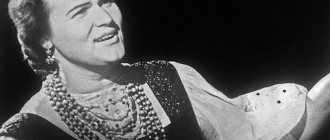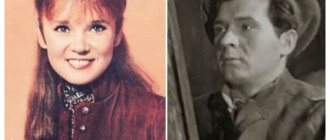History of the Gogol family
The future writer was born into a wealthy Ukrainian family. Nikolai Vasilyevich Gogol became the third of twelve children. But since the first two boys died in infancy, for his parents he was like a long-awaited firstborn. Shortly before giving birth, mother fervently prayed to St. Nicholas the Wonderworker, and therefore it was decided to name the born boy Nikolenka.
Of the nine children born after him, only four sisters survived: Mashenka, Anyuta, Lisa and Olya, with whom Kolya was very friendly. Partly under the influence of his sisters, partly due to his gentle character, Nikolai Vasilyevich spent his entire childhood in “female” activities: he loved to sew, knit, weave, and embroider. By the way, even as an adult, when writing his works, he often knitted, and also loved to dress like a dandy and made some of his outfits himself with great diligence and pleasure.
Gogol's father
The writer’s father, Vasily Afanasyevich Gogol-Yanovsky, worked for a long time in the Little Russian Postal Department, but in 1805 he retired, got married and began to live permanently with his family on the Vasilyevka estate in Poltava province. There, in the village of Sorochintsy, in the spring of 1809, Nikolai Gogol was born. Vasily Afanasyevich was an educated, diversified person, he loved fun, jokes, literature, he was known as a good poet and writer, and his special passion was the theater.
Together with his friend, the landowner Troshchinsky, Vasily Gogol-Yanovsky organized a home theater and enthusiastically wrote plays for it and participated in productions. Nikolai Vasilyevich probably owes his poetic and writing talent to his father. As for the double surname, the writer “got rid of its second part as unnecessary” when he began publishing and entered the history of world literature simply as “Nikol Gogol.”
Vasily Gogol-Yanovsky, father of Nikolai Gogol
Gogol's mother
The writer’s mother, Maria Ivanovna, nee Kosyarovskaya, according to the recollections of contemporaries, was incredibly beautiful in appearance and was known as an enviable bride. Vasily Gogol-Yanovsky married a girl when she was barely 14 years old. Maria Ivanovna was very pious and homely all her life, she followed her husband everywhere, even when he went somewhere to do housework, he always took his wife with him. It is believed that Gogol inherited his craving for mysticism and the other world from his mother, since she always told her children many stories and legends about goblins, goblins and evil spirits.
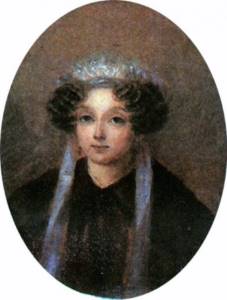
Maria Ivanovna Gogol-Yanovskaya (born Kosyarovskaya), mother of Nikolai Gogol
The boy's highly impressionable nature literally absorbed all these stories, and he carried them throughout his life, later reflecting them in his work. It is also known that while already living in St. Petersburg, Gogol wrote to his mother many times with a request to send him new details of Ukrainian life: what clothes his ancestors wore, what their customs were, and asked to provide him with new parables and legends. The mother happily shared with her son what she knew herself or learned from local residents.
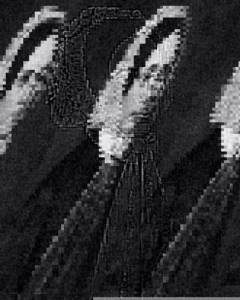
The writer's mother Maria Gogol-Yanovskaya. Image: for-teacher.ru
Childhood and youth
To this day it is unknown when Nikolai Vasilyevich was born. Some chroniclers believe that Gogol was born on March 20, while others are sure that the true date of birth of the writer is April 1, 1809.
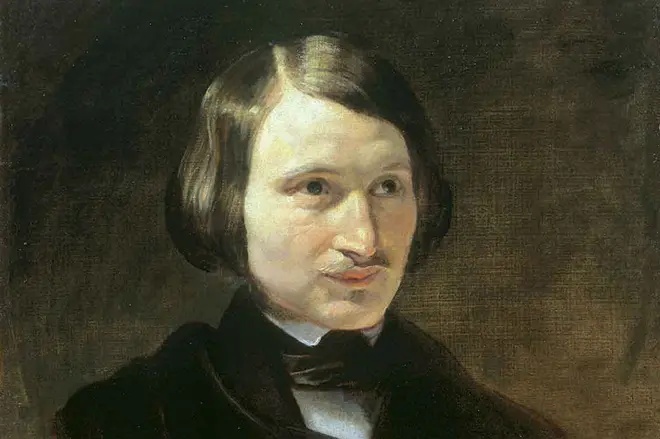
Portrait of Nikolai Gogol
The master of phantasmagoria spent his childhood in Ukraine, in the picturesque village of Sorochintsy, Poltava province. He grew up in a large family - in addition to him, 5 more boys and 6 girls were raised in the house (some of them died in infancy).
The great writer has an interesting pedigree, dating back to the Cossack noble dynasty of the Gogol-Yanovskys. According to family legend, the playwright’s grandfather Afanasy Demyanovich Yanovsky added the second part to his surname to prove blood ties with the Cossack hetman Ostap Gogol, who lived in the 17th century.
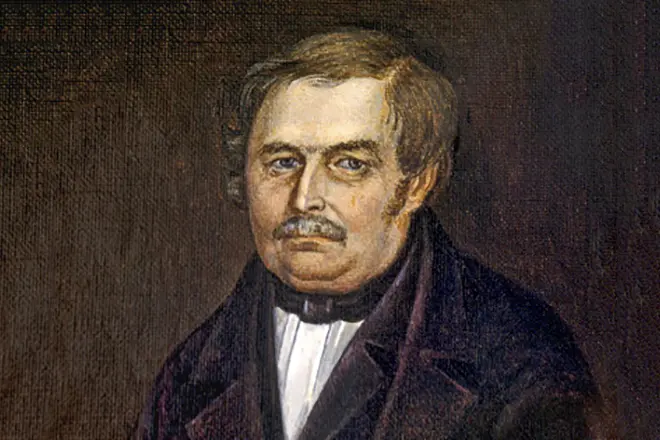
Vasily Afanasyevich, father of Nikolai Gogol
The writer's father, Vasily Afanasyevich, worked in the Little Russian province in the postal department, from where he retired in 1805 with the rank of collegiate assessor. Later, Gogol-Yanovsky retired to the Vasilyevka estate (Yanovshchina) and began farming. Vasily Afanasyevich was known as a poet, writer and playwright: he owned the home theater of his friend Troshchinsky, and also performed on stage as an actor.
For productions, he wrote comedy plays based on Ukrainian folk ballads and tales. But only one work by Gogol the Elder has reached modern readers - “The Simpleton, or the Cunning of a Woman Outwitted by a Soldier.” It was from his father that Nikolai Vasilyevich adopted his love for literary art and creative talent: it is known that Gogol Jr. began writing poetry from childhood. Vasily Afanasyevich died when Nikolai was 15 years old.
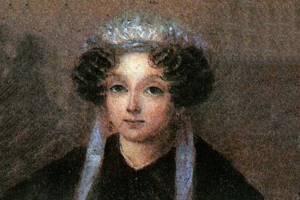
Maria Ivanovna, mother of Nikolai Gogol
The writer's mother, Maria Ivanovna, née Kosyarovskaya, according to contemporaries, was pretty and was considered the first beauty in the village. Everyone who knew her used to say that she was a religious person and was involved in the spiritual education of children. However, Gogol-Yanovskaya’s teachings were reduced not to Christian rituals and prayers, but to prophecies of the Last Judgment.
It is known that the woman married Gogol-Yanovsky when she was 14 years old. Nikolai Vasilyevich was close to his mother and even asked for advice on his manuscripts. Some writers believe that thanks to Maria Ivanovna, Gogol’s work is endowed with fantasy and mysticism.
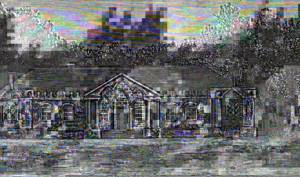
Nikolai Gogol's childhood home
Nikolai Vasilyevich’s childhood and youth were spent surrounded by peasant and gentleman’s life and were endowed with those bourgeois characteristics that the playwright meticulously described in his works.
When Nikolai was ten years old, he was sent to Poltava, where he studied science at school, and then learned to read and write from a local teacher, Gabriel Sorochinsky. After classical training, the 16-year-old boy became a student at the Gymnasium of Higher Sciences in the city of Nizhyn, Chernihiv region. In addition to the fact that the future classic of literature was in poor health, he was also not strong in studies, although he had an exceptional memory. Nikolai’s relationship with the exact sciences did not work out, but he excelled in Russian literature and literature.
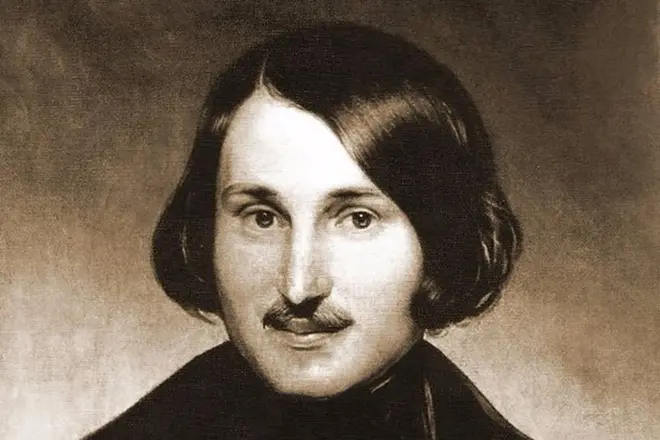
Nikolay Gogol
Some biographers argue that the gymnasium itself is to blame for such an inferior education, rather than the young writer. The fact is that in those years the Nizhyn gymnasium had weak teachers who could not provide students with decent education. For example, knowledge in moral education lessons was presented not through the teachings of eminent philosophers, but through corporal punishment with a rod; the literature teacher did not keep up with the times, preferring Pushkin to the classics of the 18th century.
During his studies, Gogol gravitated toward creativity and zealously participated in theatrical productions and improvised skits. Among his comrades, Nikolai Vasilyevich was known as a comedian and a perky person. The writer communicated with Nikolai Prokopovich, Alexander Danilevsky, Nestor Kukolnik and others.
Gogol's studies
The writer received his initial education at home. He read a lot and tried to compose from the age of five. It used to be that when he and his father went around the property in a chaise, the father would give his son a topic for essays. And the boy drove around all day, looked at the beautiful Ukrainian landscapes and composed odes to his native nature and everything he saw. We can safely say that the generous Little Russian nature and Ukrainian folklore are two things that shaped Gogol the writer.
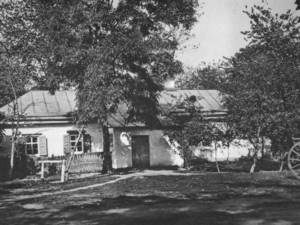
House of Doctor Trokhimovsky in Sorochintsy, where Nikolai Gogol was born. Velyki Sorochintsy, Poltava region, Ukraine. Illustration for the book by Joseph Khmelevsky “Gogol in the Motherland: Album of artistic phototypes and heliogravures.” Kyiv, 1902
When Kolenka was 10 years old, his parents sent him to study in Poltava, first he graduated from college, and then from the Gymnasium of Higher Sciences. The first years of study were incredibly difficult for Gogol: his preparation left much to be desired - unlike many of his peers, he did not know foreign languages at all, was weak in the exact sciences, was not distinguished by physical health and endurance, and was quite withdrawn.
In those years, the future writer experienced first-hand the fate of those very “little people” whom he would later describe so vividly in his works. And the words of Akaki Akakievich Bashmachnik from “The Overcoat”: “Well, why, why are you offending me?”, he himself probably uttered more than once, if not out loud, then mentally.
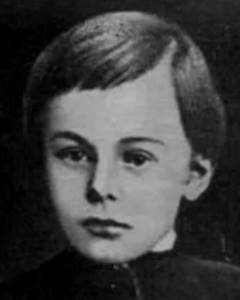
Nikolai Gogol-Yanovsky in childhood. Image: book-briefly.ru
However, at the same time, Gogol had a phenomenal memory and showed excellent abilities in Russian literature. And a few years later, another of his bright talents was discovered - the talent of an actor, parodist and humorist. He found friends with similar interests, with whom they engaged in literary experiments, prepared and staged performances in the gymnasium theater, and published their own student newspaper. Suddenly, a completely different Gogol appeared before everyone - bright, witty, able to make accurate and incredibly funny parodies of any person, including teachers. And the remaining years of study with Gogol were rich and interesting.
Gogol in the only photo. Author Sergei Levitsky, Rome, 1845
Gogol's father
Vasily Afanasyevich worked in the postal department of the Little Russian province. In 1805 he retired, receiving the rank of collegiate assessor. A little later, the man left for the Vasilievka estate, where he began farming. At that time, Vasily Afanasyevich was known as a writer, poet and playwright. he managed a home theater that belonged to his friend, and also played on the stage as an actor.
Gogol Sr. himself wrote Ukrainian plays of a comedic nature, taking folk tales and ballads as a basis. However, only one of them has survived to this day - “The Simpleton, or the Cunning of a Woman Outwitted by a Soldier.” Vasily Afanasyevich passed on his talent and immense love for literature to one of his sons, Nikolai Gogol, whose biography still arouses considerable interest among fans of his work. There is evidence that Gogol Jr. composed his first poems as a child. his father left this world when his son was 15 years old.
For productions, he wrote comedy plays based on Ukrainian folk ballads and tales. But only one work by Gogol the Elder has reached modern readers - “The Simpleton, or the Cunning of a Woman Outwitted by a Soldier.” It was from his father that Nikolai Vasilyevich adopted his love for literary art and creative talent: it is known that Gogol Jr. began writing poetry from childhood. Vasily Afanasyevich died when Nikolai was 15 years old.
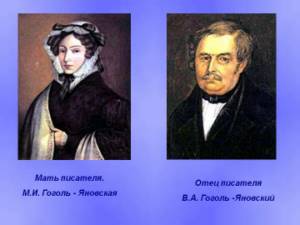
Gogol's arrival in St. Petersburg
In the winter of 1828, after graduating from high school, Nikolai Vasilyevich decides to go to St. Petersburg. Gogol's biography gets a new twist. By that time, his father had already died (the death was sudden, it was a real blow for the whole family), the son tried as best he could to improve the affairs of the estate, which, without the head of the family, began to go wrong, since the mother turned out to be completely unsuited for running a large farm. But Gogol was not very successful in these matters, providing the greatest help to the family by renouncing his share of the inheritance so that the mother could distribute these funds among her younger daughters.
Gogol did not want to return home at all, and he went to the capital, tormented by the desire to serve the Fatherland, to do something great and useful for Russia. How he could be useful to the state, he could not say for sure, but at that time he did not definitely connect it with literature, thinking that he could be useful in the field of public service.
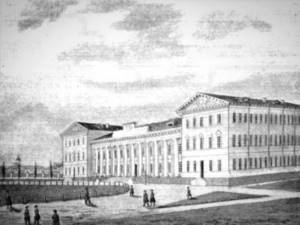
Emil Wiesel. Nizhyn Gymnasium of Higher Sciences. 1830s. Institute of Russian Literature (Pushkin House) of the Russian Academy of Sciences, St. Petersburg
However, St. Petersburg greeted him completely unfriendly. It turned out that Gogol’s meager savings were absolutely not enough to live and feed himself in the expensive capital. The service in the Department of Appanages, where he was able to enter, turned out to be monotonous, tedious, boring and extremely formal, which is why Gogol soon abandoned it. He tried to enter the theater, because he felt talent and a great desire to serve art, but he never passed a single audition.
They say that he was not accepted because of his inexpressive voice, although for many of his classmates this was a complete surprise, because they had seen Gogol on stage and knew for sure that he had colossal acting talent! His works of those years either did not want to be published at all, or were not popular. The ridicule of literary critics painfully wounded the sensitive pride of the future classic; he experienced a painful search for his calling and place in life.
Biography of Gogol
It is still not known for certain when exactly Nikolai Vasilyevich Gogol was born. The official date of his birth is considered to be March 20, 1809.
Little Kolya spent his entire childhood in the village of Sorochintsy, Poltava province. He grew up in a very large family. He had 5 brothers and 6 sisters, although some of them died in infancy.
His family came from the old noble family of the Janowskis. According to family legend, his grandfather Afanasy Yanovsky decided to add another part to his surname to prove his relationship with the Cossack hetman Ostap Gogol.
Thus, they began to bear the surname Gogol-Yanovsky.
Gogol's parents
The father of the future writer, Vasily Afanasyevich, worked in the postal department, rising to the rank of collegiate assessor. He was a creative person and was keenly interested in art, which undoubtedly influenced the biography of young Nikolai.
The head of the family showed a talent for poetry and writing. He also directed the home theater of one of his comrades, and periodically participated in performances himself.
It is known that Gogol Sr. wrote comedic plays, but only one of them has survived to this day - “The Simpleton, or the Cunning of a Woman Outwitted by a Soldier.” Obviously, it was from his father that Nikolai Vasilyevich adopted his passion for literature, and already in early childhood he began to write poetry.
Nikolai Gogol's mother's name was Maria Ivanovna. She got married when she was barely 14 years old. She was half her husband's age. In her youth, she was particularly attractive and was considered the first beauty in the village. Mary was a God-fearing person and tried to raise her children in the same spirit. She paid special attention to various biblical prophecies and the Last Judgment of humanity, which was to occur soon.
Some biographers of Gogol believe that it is thanks to his mother that the writer’s work is imbued with mysticism. Since as a child he saw how poor peasants and wealthy gentlemen lived, in his works he began to skillfully describe the intricacies of everyday life and the emotional experiences of people.
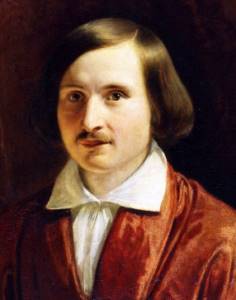
Pushkin circle
But be that as it may, Gogol continued to write for St. Petersburg publications, and individual works increasingly found their way into print. One of the editors who appreciated the writings of the novice author was Anton Delvig, who at that time headed the Northern Flowers magazine. It was A. Delvig who introduced Gogol to Vasily Zhukovsky and Pyotr Pletnev, and they, in turn, helped Nikolai Vasilyevich get a good teaching position at the Women's Patriotic Institute, and also recommended him as a tutor to rich noble families. Now that the financial issue was closed for Gogol, he was able to devote himself wholeheartedly to creativity and began writing a series of essays about Ukraine.
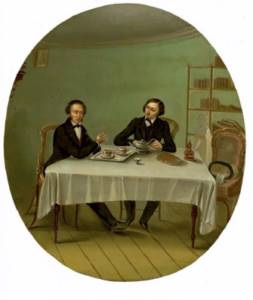
"Pushkin and Gogol". Artist Nikolay Alekseev
In 1831, Gogol’s book “Evenings on a Farm near Dikanka” was published, which included four stories: “Sorochinskaya Fair”, the previously published “Evening on the Eve of Ivan Kupala”, “May Night, or the Drowned Woman” and “The Missing Letter”. The book took place in the author’s homeland, in the Mirgorod district of Poltava province. The heroes were residents of a Ukrainian village, and the plot mixed everyday life with mystical motifs that were common among the villagers.
The book immediately became incredibly popular and was highly praised by leading writers of the time. Evgeny Baratynsky admired the author’s light style and gaiety. And Alexander Pushkin simply became delighted with all the stories and said that there was no such writer in Russian literature who could so simply and heartily convey folk speech, mischievous humor and the beauty of nature.
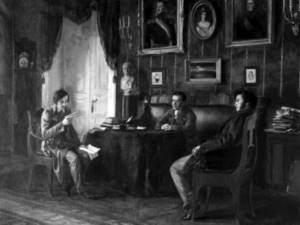
Peter Geller. Nikolai Gogol and Vasily Zhukovsky with Alexander Pushkin in Tsarskoe Selo (fragment). 1910. Image: pouchkin.com
A year later, Gogol published the second part of “Evenings on a Farm near Dikanka.” It included four more stories: “The Night Before Christmas”, “Terrible Revenge”, “Ivan Fedorovich Shponka and His Aunt” and “The Enchanted Place”. The second part was received no less enthusiastically than the first. Gogol became “his own” in the best literary salons of St. Petersburg and became closely involved in the so-called “Pushkin circle.” At this time, he met actor Mikhail Shchepkin, writer Sergei Timofeevich Aksakov and his sons Konstantin and Sergei, publicist Mikhail Pogodin. Gogol will remain friends with all of them until the end of his life.
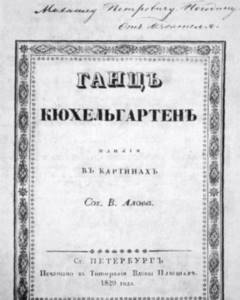
A copy of “Hanz Küchelgarten” with a dedicatory inscription from Nikolai Gogol to the historian Mikhail Pogodin. 1829. State Public Historical Library of Russia, Moscow
In 1834, Gogol was offered a position as a history teacher at St. Petersburg University. He enthusiastically accepted the offer: during the day he lectured in university classrooms, and in the evenings he studied the history of Ukraine and wrote new works. So soon new collections “Arabesques” and “Mirgorod” were published, as well as several historical articles. All works are warmly received by the public, and eminent masters of literature unanimously recognize that with each new book Gogol’s talent blossoms and manifests itself more and more brightly.
Novel "Dead Souls"
By all accounts, without detracting from the merits of Gogol’s other remarkable works, the comedy “The Inspector General” and the novel “Dead Souls” are key in the writer’s bibliography. The idea for both books was suggested to Nikolai Vasilyevich by Alexander Pushkin. Pushkin heard the real story of the registration of “dead souls” from one landowner during his exile in Chisinau. In 1835, Gogol began writing the novel and after some time read the outline to Pushkin.
At first he laughed a lot, but with each new page he turned, he became more and more gloomy and frowning, and in the end he said: “God, how sad our Russia is!” But after some time, Gogol put aside the manuscript of “Dead Souls” without completing it.
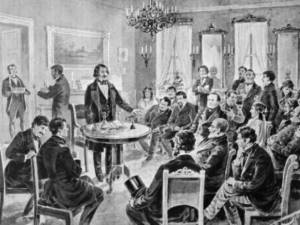
Vladimir Taburin. Nikolai Gogol reads “The Inspector General” in front of the artists of the Moscow Maly Theater and invited persons (fragment). Image: magisteria.ru
Comedy "The Inspector General"
Pushkin sent the story about the gentleman who pretended to be an official to Gogol in a letter, in response to his request to share an idea for a play. When, after some time, Nikolai Vasilyevich read the written comedy in a circle of close friends, everyone unanimously advised Gogol to immediately stage it on stage. However, this turned out to be not so easy to do - the censors resolutely did not allow the play to pass. It took the intervention of Zhukovsky, who was closely acquainted with the imperial family. And only the personal command of Nicholas I helped ensure that the play was staged.
The emperor himself was delighted with the comedy, and most representatives of the literary circle also found it topical and talented. But officials, of whom there were many in St. Petersburg, merchants and police, took up arms against the author, declaring that “nothing is sacred” to him. To Gogol’s surprise, he was shamelessly scolded, but at the same time it was absolutely impossible to get tickets for all four performances of “The Inspector General” in St. Petersburg - they were sold out instantly.
A few weeks later, Mikhail Shchepkin presented the comedy in Moscow. The reaction was approximately the same. As Gogol himself said: “In The Inspector General I collected all the worst things that happened in Russia at that time in order to ridicule it all at once.”
The marriage of Gogol's parents was strong and successful

Nikolai Vasilyevich Gogol was one of 12 children who were born into a successful marriage. His parents were madly attached to each other, but the first stillborn children greatly frightened the young couple. Praying to Nicholas the Pleasant, they promised that the first living baby would be named in honor of the saint. The birth of Gogol became a real miracle for religious parents.
The death of her husband for Maria Ivanovna came as a bolt from the blue: the woman’s mind was completely damaged. She talked to the deceased and demanded that a grave be dug for her and placed next to her. Then she fell into a daze, refused to eat, and aggressively resisted all attempts to feed her for two weeks. It was clear to Nikolai and everyone around him that this was a mental breakdown that was unlikely to be cured.
In this state, Maria Ivanovna lived until she was 77 years old, but fate struck her again - her son Nikolai died in the prime of his life. Walking behind a child’s coffin is the worst thing, and the poor mother outlived Nikosha by as much as 16 years. Meanwhile, tragedies continued in Gogol's family: the writer's nephew committed suicide at a young age.
The mysticism of the marriage of Gogol’s parents also influenced his younger sister: Olga was lagging behind in mental development, moved uncertainly until she was five years old, and had difficulty acquiring new knowledge and skills. In adulthood she became a religious fanatic. At the same time, she was afraid to die and bowed in church every day. Gogol’s other sister also “loved to fantasize” and often woke up the maids in the middle of the night, took them out into the garden and forced them to sing and dance.
Foreign trips
After the production of The Inspector General, Gogol rather hastily left Russia and went to Europe, where he lived for the next 10 years. He explained his departure by saying that he left too much mental energy for staging the comedy, and he needed time to recover. He lived for some time in Germany, then moved to Switzerland, and later to Paris.
It was in France that he was overtaken by the news of the death of Alexander Sergeevich Pushkin, which Gogol experienced incredibly hard, and, perhaps, was unable to cope with this loss until the end of his days. At first he wanted to return to St. Petersburg, however, then he changed his mind and left for Italy. There, in 1841, Gogol finished work on the novel “Dead Souls”, after which he returned to Russia, settling in Moscow with his friend Mikhail Pogodin.
Again, the novel was published after overcoming numerous censorship obstacles after some time. “Dead Souls,” as well as “The Inspector General,” caused mixed reviews. Some admired the novel, others called the author “an enemy of Russia who should be exiled to Siberia.”
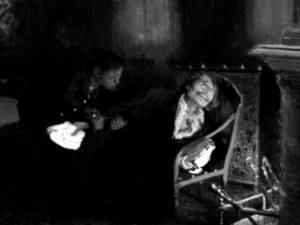
Ilya Repin. Nikolai Gogol burns the second volume of Dead Souls (fragment). 1909. State Tretyakov Gallery, Moscow
Gogol himself at this time began to suffer from prolonged depression, and in 1842 he again went abroad. There he works on the second volume of “Dead Souls” (according to the writer’s plan, the novel should have three parts, and by the end of the third, Chichikov had to radically change his views on life and be transformed. But some time later, Gogol had a crisis, and the writer in a fit of despair, he burned the manuscript.
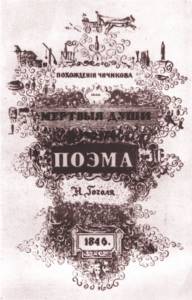
Title page of the second edition of Dead Souls. Sketch by N.V. Gogol
How did Gogol die?
In 1849, Gogol returned to Russia and began working on restoring the burned second volume of Dead Souls (which he burned in 1845). In 1852 (February 7) Ekaterina Khomyakova died. She was one of his closest friends and meant a lot to him.
This event had a very great influence on the writer: he stopped eating, writing and he was “gripped by the fear of death.” Later, on the night of February 11–12, he burned all his manuscripts. On February 21 (March 4, new style), 1852, Gogol died. He was 42 years old.
The writer was first buried in Moscow at the Danilovsky cemetery, and then he was reburied at the Novodevichy Convent.
The last years of Gogol's life
Only in 1849 Nikolai Vasilyevich returned to Russia. He reconstructed from memory the entire text of the second volume of his novel. But this was difficult for him, since the writer was again and again attacked by attacks of inhuman melancholy, when he could not do anything and he did not want to live at all. From January 1852, he began to zealously observe all church fasts and completely gave up food. This led to even more serious health problems. On the night of February 11-12, he burned several of his manuscripts, including the second volume of Dead Souls.
And the following days until his death, which occurred on February 21, 1852, he not only did not leave the house, but also practically did not get out of bed. Gogol was buried at the Danilovsky cemetery in Moscow, and later, in 1931, his remains were transferred to the Novodevichy cemetery. Numerous rumors that Nikolai Vasilyevich was allegedly buried in a state of lethargic sleep and was still alive at the time of burial do not have any reliable documentary evidence and are more like speculation.
Death
After visiting the Holy Land, the writer’s condition improved. In 1849-1850 in Moscow, he enthusiastically wrote the last pages of Dead Souls. In the fall he visited Odessa, spent the spring of 1851 in his native land, and returned to Belokamennaya in the summer.
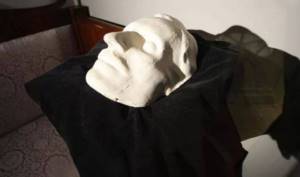
The death mask of Nikolai Gogol
However, having completed work on the 2nd volume of the poem in January 1852, he felt overworked. He was tormented by doubts about success, health problems, and a premonition of his imminent death. In February he fell ill and on the night of the 11th to the 12th he burned all the last manuscripts. On the morning of February 21, the outstanding master of the pen passed away. Nikolay Gogol. The Mystery of Death The exact cause of Gogol's death is still a matter of debate. The version of lethargic sleep and burial alive was refuted after a pre-mortem cast of the writer’s face. It is widely believed that Nikolai Vasilyevich suffered from a mental disorder (the founder of the theory was psychiatrist V.F. Chizh) and therefore could not take care of himself in everyday life and died of exhaustion. A version was also put forward that the writer was poisoned by a medicine for a stomach disorder with a high content of mercury.
Gogol's personal life
Nikolai Vasilyevich Gogol was a completely different person to start a family and offspring. For most of his life, he was incredibly ascetic, never acquiring his own home, living in rented apartments or with friends, and in general did not take any steps to arrange his personal life. However, history has preserved the names of two women who somehow touched the heart of the great classic.
Alexandra Smirnova-Rosset
The first was the imperial maid of honor Alexandra Smirnova-Rosset. The beautiful, dark-skinned, brown-eyed beauty won the hearts of many prominent gentlemen of the time, including Mikhail Lermontov, Pyotr Vyazemsky and Alexander Pushkin. Nikolai Gogol was also captivated by her charms. Having met the girl through Vasily Zhukovsky, Gogol began a friendly correspondence with the maid of honor, which developed into a very tender relationship. The girl clearly understood that she was loved by the writer and responded to him with the most sincere affection.
But Nikolai Vasilyevich did not even talk about any romantic relationships, either out of fear of being rejected by the beauty, or because he did not feel an urgent need for such a relationship. As a result, after some time, Alexandra Rosset received a marriage proposal from a successful Foreign Ministry official, Nikolai Smirnov, and accepted it, making, by all accounts, a brilliant match.
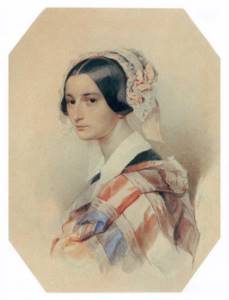
Portrait of Alexandra Osipovna Smirnova-Rosset. Author Pyotr Fedorovich Sokolov. 1834-35, cardboard, watercolor All-Russian Museum of A.S. Pushkin
Maria Sinelnikova
Another woman who had a heartfelt affection for the writer was his cousin Maria Sinelnikova. The girl was married off quite early, but family life for this married couple did not work out at all, and soon Maria left her husband and moved with her children to her family estate near Kharkov. Nikolai Gogol came there one day with his mother and sisters.
From the first sentences, it became clear that Maria had found a kindred spirit in the person of the writer, they communicated a lot, and the woman even confessed her feelings to Gogol. But this happened a couple of years before his death, when the writer was already completely immersed in mysticism and religion, fasted almost all the time and did not even think about marriage. Maria and Nikolai Vasilyevich corresponded all the time until his death, the writer answered all her letters. Maria Sinelnikova retained the fondest memories of Gogol until the end of her life.
What is the mysticism of the marriage of Gogol’s parents, which influenced the fate of their son
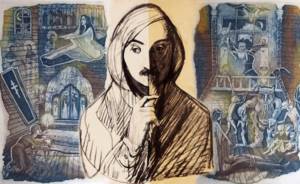
In the century before last there were much fewer educated and enlightened people than there are now. It’s no wonder that Gogol’s maternal grandfather and grandmother were superstitious and very religious, and his aunt was completely “odd.” She thought late, believed in wild advice, could not cope with time and was late everywhere. In addition, “sitting at the table, she grimaced,” and, after having lunch, “she asked to give her a piece of bread.”
Vasily Afanasyevich Gogol-Yanovsky - Gogol's father, was a man with a sense of humor, educated and creative, a jokester and an excellent storyteller. He wrote poetry and prose, as noted by A.N. Annensky, however, was suspicious. He constantly found some kind of illness in himself, believed in the destiny of fate, and even saw his wife in a dream when he was 14 years old. The next day he saw the girl from the dream visiting his friends, and since Mashenka was only a year old, he waited 13 whole years to take her as his wife.
Maria Ivanovna, Gogol’s mother, was extremely unbalanced, her mood swings could not be explained. Her suspicion reached extreme limits and “reached an almost painful state.” From a state of unbridled joy she fell into prostration, sat for several hours without changing her posture, looking at one point, not reacting to calls.
Apparently, the spouses were at least neurotic, with a lot of suppressed complexes and frustration pressing on them. Obviously, this was the mysticism of the marriage of Gogol’s parents, biographers say. But little Nikolai, as a child, noticed all these cute oddities and later endowed his heroes with subtle psychological touches.
Literature
- “Culture.RF” is a humanitarian educational project dedicated to the culture of Russia. https://www.culture.ru/
- Aristov N. Ya. Historical significance of Gogol’s works // Historical Bulletin. Historical and literary magazine. - St. Petersburg. 1883.
- Mandelstam I. On the nature of Gogol’s style. - Helsingfors, 1902.
- Merezhkovsky D.S. Gogol and the devil. - M.: 1906.
- Ovsyaniko-Kulikovsky D. N. Gogol. Ed. 4th, add. - St. Petersburg: 1912.
- Vengerov S. A. Writer-citizen Gogol. — Collected works, vol.2. - St. Petersburg: 1913.
- Chudakov G.I. On the relationship of Gogol’s work to Western European writers. - Kyiv, 1908.
- Shambinago S.K. Trilogy of Romanticism (N.V. Gogol). - M.: 1911.
- Kotlyarevsky N. A. N. V. Gogol. 1829-1842. — 4th ed. - Pg.: 1915.
- Slonimsky A. L. Gogol’s comic technique. - Pg.: 1923.
- Bely A. Gogol's mastery. - M.-L., 1934.
- Vinogradov V.V. The evolution of Russian naturalism. Gogol and the “natural” school. Sketches about Gogol's style // Selected works. Poetics of Russian literature. Rep. ed. M. P. Alekseev, A. P. Chudakov. - M.: 1976.
- Gukovsky G. A. Realism of Gogol, 1959.
- Lunin B.V. Living pages. A. S. Pushkin, N. V. Gogol, M. Yu. Lermontov, V. G. Belinsky. - M.: Children's literature, 1970. - Circulation 100,000 copies.
- Gogol’s work // Pereverzev V. F. Gogol. Dostoevsky... - M., 1982.
- How Gogol’s “Overcoat” was made // Eikhenbaum B. M. About prose. - L. 1969.
- Tynyanov Yu. N. Dostoevsky and Gogol. (to the theory of parody) // Tynyanov Yu. N. Poetics. History of literature. Movie. - M., 1977.
- Tyumeneva G. A. Gogol and music. - M.: Muzyka, 1966.
- Mann Yu. V. Gogol's comedy “The Inspector General”. - M. 1966.
- Mann Yu. V. Gogol's poetics. - M., 1978.
- Mann Yu. V. The courage of invention: Features of Gogol’s artistic world. — 3rd ed. - M., 1985.
- Mann Yu. V. In search of a living soul. “Dead Souls”: writer - critic - reader. — 2nd ed. - M., 1987.
- Mann Yu. V. Notes on Gogol’s “non-Euclidean geometry”
- Elistratova A. A. Gogol and the problems of the Western European novel. - M., 1972.
- Lotman Yu. M. The problem of artistic space in Gogol’s prose: Study. zap. Tartus. state un-ta. (Transactions on Russian and Slavic philology, vol. 11), in 209. - 1968.
- Rabelais and Gogol // Bakhtin M. M. Questions of literature and aesthetics. - M., 1975.
- Khrapchenko M. B. N. Gogol. Literary path... - Collected works. T. 1. - M., 1980.
- Nikolaev D. P. Gogol's satire. - M., 1984.
- Krivonos V.I. “Dead Souls” by Gogol and the formation of new Russian prose. — Voronezh, 1975.
- Palamarchuk P. (under the pseudonym V.D. Nosov) “Key” to Gogol. — London, 1985
- Sazanovich E.I. Nikolai Vasilievich Gogol. Living and dead souls: essay // Youth, No. 4, 2013.
- Smirnova E. A. Gogol’s poem “Dead Souls”. - L., 1987.
- Günther H: Das Groteske bei NV Gogol: Formen und Funktionen. — Munich, 1968.
- Proffer CR The simile and Gogol's Dead Souls. — Hague, 1967.
- Erlich V. Gogol. — New Haven, 1969.
- Braun MNV Gogol. Eine literarische Biographie. — Munich, 1973.
- Fanger D. The creation of N. Gogol. - Cambridge (MA), 1979.
- Schreier H. Gogol's religiöses Weltbild und sein literarisches Werk. — Munich, 1977.
- Zolotussky I. P. Gogol. — 7th ed. - M.: Young Guard, 2009. - 485 p. — (Life of remarkable people: ser. biogr.; issue 1170)
- Dmitrieva E. E. N. V. Gogol in the Western European context: Between languages and cultures. - M.: IMLI RAS, 2011.
- Kunov V.K. — Encyclopedic dictionary “Wise thoughts in the works of Nikolai Gogol.” 622 pp., 366 topics, 1098 articles, etc. Kyiv, “KIT” - 2008.
- N.V. Gogol in Russian criticism: Collection of articles / Prepared. text by A.K. Kotov and M.Ya. Polyakov; Entry Art. and note. M. Ya. Polyakova.. - M.: State. published artist lit., 1953. - LXIV, 651 p.
- Gogol in Russian criticism: Anthology / Comp. S. G. Bocharov. - M.: Fortuna EL, 2008.
- Gogol Nikolai Vasilievich // Orthodox Theological Encyclopedia. Volume 4. St. Petersburg. Publishing house "Petrograd". Publication of the St. Petersburg Theological Academy. Supplement to the spiritual magazine “Strannik” for 1903.
- Monakhova I. R. N. V. Gogol: reflections on the eternal // Delphis Magazine - No. 74(2) - 2013
- A. N. Pypin. Gogol, Nikolai Vasilyevich // Encyclopedic Dictionary of Brockhaus and Efron: in 86 volumes (82 volumes and 4 additional). - St. Petersburg, 1890-1907.
- The world greatness of Gogol (To the results of scientific sessions dedicated to the 100th anniversary of the death of N.V. Gogol)
- Chernyshevsky N. G. Essays on the Gogol period of Russian literature // Complete works: in 15 volumes - M., 1947. - T. 3. - P. 5-309.
- Uzelevsky B.I. Dostoevsky, Gogol and Bulgakov. - almanac “Dostoevsky and world culture”, No. 18, St. Petersburg, 2003.
Share the news on Social Networks:
Gogol's family
The Janowskis are an old Polish noble family. In the volumes of "Polish Coats of Arms" the Janowski surname has been mentioned since 1376. In Little Russia, the family dates back to Yakov Yanovsky, who lived in the middle of the 17th century. His son Ivan and grandson Demyan were priests in the Lubny regiment. The latter’s son, Nikolai Vasilyevich Gogol’s grandfather, Afanasy Demyanovich, studied at the Kyiv Academy, served as a military clerk, and was a second major. For the first time, the surname of the writer’s grandfather with the addition “Gogol” appeared in the “Charter of Nobility”, which he received on October 15, 1792.Gogol had many literary gifted people in his family. His mother, Maria Ivanovna, carried on extensive correspondence with many writers. And the family of Shostak, Gogol’s maternal grandmother, Maria Ilyinichna, came from Tatars, the family of great-grandmother Shcherbak came from Russians. The ancestors of the genius were also Doroshenko, Skoropadsky, whose names were indicated by the grandfather of the genius in a document of 1788.
In addition to Nikolai, Vasily and Marina Gogol had five children - son Ivan (1810 - 1819), daughters Maria (1811 - 1844), Anna (1821 - 1893), Elizaveta (1823 - 1864), Olga (1825 - 1907). Gogol's parents were considered middle-class landowners and had 1000 acres of land and 400 souls of serfs.
Vasily Afanasyevich Gogol (1780 - 1825)
Gogol, Vasily Afanasyevich - father of N.V. Gogol, a talented storyteller and writer. The son of a regimental clerk, Gogol was a typical Little Russian by origin, character, mentality and literary activity. He was registered in the postal service, retired in 1805 with the rank of collegiate assessor and got married.
In the early 20s, he became close friends with the former Minister of Justice Dimitry Prokofievich Troshchinsky, who lived in retirement in the village of Kibintsy and set up a home theater here. Gogol was the director of this theater and an actor. He composed comedies for this theater in the Little Russian language. Two of his comedies are known: “The Vivtsa Dog” and “The Simpleton, or the Cunning of a Woman Outwitted by a Soldier.” The comedies were written between 1822 and 1825. The plots are borrowed from folk tales. The first comedy has not reached us and is known in short retellings. The second was published by Kulish in Osnova (1862, II), and Kulish, in the preface, compares Gogol’s “The Simpleton” with Kotlyarevsky’s “Moskal-Charivnik” and gives preference to the first play. "The Simpleton" was published separately in 1872, 1878 and 1882. Literature about Gogol is listed in “Pokazhchik” by M. Komarov, 410. align=center>
Maria Ivanovna Kosyarovskaya (1791-1868)
Gogol's mother came from a landowner family. According to legend, she was the first beauty in the Poltava region. She married Vasily Afanasyevich at the age of fourteen. Maria Ivanovna reports about her family life: “My life was the calmest; My husband and I had a cheerful character. We were surrounded by good neighbors. But sometimes dark thoughts came over me. I foresaw misfortunes and believed in dreams. At first I was worried about my husband's illness. Before his marriage, he had a fever for two years. Then he was healthy, but suspicious..."
Maria Ivanovna was distinguished by her greatly increased impressionability, religiosity and superstition. Vasily Afanasyevich was also superstitious. His story of how he married Marya Ivanovna breathes with superstition: as if the Mother of God appeared to him in a dream and pointed to a certain child. Later, he recognized this same child in Maria Ivanovna.
Maria Ivanovna Gogol was extremely impressionable and suspicious: there were days, weeks, whole months when impressionability reached extreme limits, reaching an almost painful state. Sometimes she bought completely unnecessary things (even on credit), which she had to give back. Shenrock, Gogol's biographer, speaks of her “morbid daydreaming” and strange reverie that lasted for hours, with her facial expression changing sharply.
It is also known that Gogol’s mother attributed to her son all technical progress, the invention of the telegraph, railways, etc., and there was no way to dissuade her of this.
Sisters Anna and Elizabeth
Gogol loved his sisters, awkward, shy provincial girls, and really wanted them to receive a good upbringing. He placed them in the Patriotic Institute in St. Petersburg, where they studied at public expense. The sisters, as one would expect, turned out to be disfigured by the Patriotic Institute, did not know life, and were afraid of everything. Gogol, strongly attached to them, saw all this and suffered.
After graduating from college, the sisters had nothing to support. Aksakov came to the rescue, lending Gogol two thousand rubles... Aksakov received them in turn from the capitalist Bernadachi, who admired Gogol’s talent. When moving to Moscow, the sisters gave Nikolai Vasilyevich a lot of worries on the road. They screamed, cried, were capricious, quarreled with each other. “All this brought Gogol into despair both for their present and future situation...
Subsequently, the eldest son of Elizaveta Vasilievna’s sister, Nikolai Vladimirovich Bykov, was married to Marina Aleksandrovna Pushkina, the granddaughter of the great poet. So the descendants of the Gogols became related to the descendants of the Pushkins.
Afanasy Demyanovich Gogol-Yanovsky (born 1738)
Gogol's grandfather. He was the son of a priest, graduated from the Theological Academy in Kyiv and knew five languages (Russian, Latin, Greek, German and Polish). He served in the army as a military clerk and rose to the rank of second major (1794 - 1798). In 1776, he married the daughter of a wealthy Ukrainian military man, Tatyana Lizogub, whom he took away against the will of his parents. In 1777, their son Vasily was born - Gogol's future father.
For the first time, the surname of the writer’s grandfather with the addition “Gogol” appeared in the “Charter of Nobility”, which he received on October 15, 1792. Only native nobles were recorded in this book, and not those who acquired this title for military, state merits or by nobilization in 1661.
Interesting information:
- Secrets of the Gogol family
- Gogol's guardian D.P. Troshchinsky
- The mysterious curse of the Gogol house
- About family acquaintances: the Kosyarovskys, the Troshchinskys. The role of the postal department in the life of Gogol
- Veresaev V.: Gogol in life. Ancestors of Gogol
